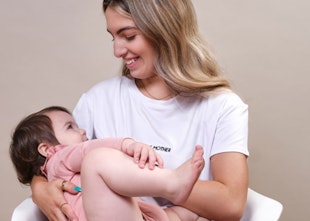
How To Breastfeed After A Caesarean Birth
If your baby is born by a caesarean section you can absolutely breastfeed. This form of birth is considered surgery and for this reason, it may bring some extra challenges but with the right support and information, you can have a great start to your breastfeeding journey.
Being armed with the facts really helps you prepare for breastfeeding in general. A Caesarean is no different. Let’s start with the anaesthetic. In some cases, the anaesthetic is in the form of a spinal or epidural and in other cases the woman may have a general anaesthetic. In the case of a general anaesthetic, the first breastfeed may be delayed until the mother is awake and the anaesthetic has begun to wear off. With an epidural or spinal you may be able to breastfeed while you are in the operating room or very soon after while you are in the recovery room.
Skin to skin is one of the most powerful starting points for breastfeeding. It regulates the baby’s body temperature, instantly comforts them and it also stimulates your milk supply. In the case of a Caesarean skin-to-skin should be available for baby and mum as soon as possible.
Pain may be an issue after a Caesarean section. You’ve just had a major incision on your lower abdomen and there may be pain from that site as well as in your uterus as it contracts after the birth. These after-pains can make breastfeeding uncomfortable as you may feel restricted in how you can hold the baby to feed them. It is a great idea to speak to your midwife or the hospital’s lactation consultant about learning how to feed your baby in a lying-down position or in positions that do not aggravate the pain as much. As your body heals you will begin to find it easier to hold the baby in many different positions.
Managing your pain is extremely important. You will be offered pain relief after the Caesarean section and it is vital that you feel as well as possible. When speaking to your care team before the birth it is recommended to mention that you will be breastfeeding your baby as this may affect the kind of pain relief and medication you will be offered in the event of a Caesarean or to manage pain after any kind of birth. Certain medications are safe to take when breastfeeding while others are not. It can pass through to the breast milk and make your baby drowsy which can make breastfeeding more difficult.
There can be a delay in your milk “coming in” after any stressful birth but in the case of vaginal and Caesarean births it should come in between days 2 and 6 (most commonly days 2-3). It is important to put your baby to the breast as often as possible and maintain skin to skin contact as this will help. You should aim to breastfeed your baby every two hours at the very least with an aim of 10-12 feeds in a twenty-four hour period. If you are separated from the baby for more than a couple of hours you should begin pumping in the hospital. They will have a sophisticated hospital grade pump.
Avoiding supplementing your baby with anything other than breast milk is really important. Unless medically directed your baby should only drink breast milk. Supplementing will reduce breast stimulation and interrupt the level of nursing needed to build your supply.
Before you leave the hospital to go home make sure your baby is latching well. A midwife or the hospital’s lactation consultant will be able to offer advice on this one. If your baby is not transferring the milk well it can affect your milk supply and how quickly the milk comes in.
When you arrive home from the hospital make sure you ask for help when you need it. Getting as much rest as possible and eating and drinking enough will be top of the list so that you can feel as well as can be while nursing your newborn. Basic tasks will feel major as you recover from surgery so you will need as much help as you can get so that you can focus on getting off to a great start with breastfeeding while you recover yourself.
Written by Tracey Quinn staff writer at FFHQ who also blogs at www.loveofliving.ie.
Online Wellbeing Family Guide
Our Online Wellbeing Family Guide will empower parents to navigate cyberbullying, social media and online safety concerns with their children in a safe way.
Get StartedBecome a Family Friendly Member
Subscribe for inspiration, empowering articles and expert tips on all things family.
Sign UpWhat is Family Friendly HQ?
Family Friendly HQ is Ireland’s trusted parenting community, dedicated to mums and dads, and families of all shapes and sizes.
Read more about us




